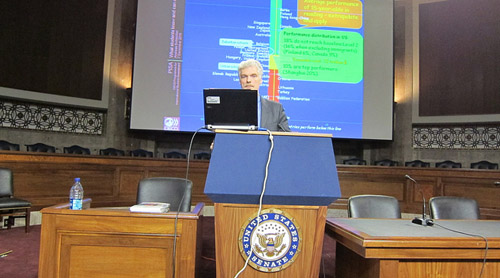
“Είναι πολύ σαφές ότι τα συστήματα υψηλής απόδοσης έχουν γενικά έναν πληθυσμό εκπαιδευτικών με υψηλή απόδοση.” — Andreas Schleicher
Επαγγελματική Κεφαλαίου, Andrew Hargreaves’ και το βιβλίο που κυκλοφόρησε πρόσφατα ο Michael Fullan, προτείνει ένα σχέδιο δράσης για τους εκπαιδευτικούς, διαχειριστές, σχολεία, περιοχές, και πολιτειακοί και ομοσπονδιακοί ηγέτες για το πώς να δημιουργήσετε μια γενιά επαγγελματικών εκπαιδευτικών του 21ου αιώνα.
Χώρες σε όλο τον κόσμο αναλαμβάνουν μεταρρυθμίσεις για να προετοιμάσουν καλύτερα τους εκπαιδευτικούς να διδάσκουν σε αίθουσες διδασκαλίας του 21ου αιώνα. Σήμερα στο τέταρτο μέρος της σειράς μας, Η Σφαιρική Αναζήτηση για Εκπαίδευση – Σε αναζήτηση των Επαγγελματίες, Ρώτησα τον Andreas Schleicher, δεδομένης της εκτεταμένης παγκόσμιας εκπαιδευτικής προοπτικής του, to weigh in on what the US and other nations can learn from some of the high performing education systems that are doing this.
Andreas Schleicher is Deputy Director for Education and Special Advisor on Education Policy to the OECD’s Secretary-General. He also provides strategic oversight over OECD’s work on the development and utilization of skills and their social and economic outcomes. This includes the Programme for International Student Assessment (PISA), η έρευνα του ΟΟΣΑ Δεξιοτήτων Ενηλίκων (PIAAC), η διδασκαλία του ΟΟΣΑ και της Διεθνούς Έρευνας Μάθηση (ΑΥΤΑ), και η ανάπτυξη και η ανάλυση των σημείων αναφοράς σχετικά με τις επιδόσεις των εκπαιδευτικών συστημάτων (INES).
What steps or changes do you believe we should make in the US in order to further advance the quality of teachers and the teaching profession going forward?
Part of the answer lies in the changes in the demands placed on teachers. In every country, there have always been great teachers, και πολλοί από εμάς είμαστε εδώ σήμερα γιατί είχαμε σπουδαίους δασκάλους. Αλλά αυτό που είναι ουσιαστικά διαφορετικό σήμερα είναι ότι τα εκπαιδευτικά συστήματα πρέπει τώρα να εξοπλίσουν όλους τους εκπαιδευτικούς, και όχι μόνο μερικά, για αποτελεσματική μάθηση. Στο ΠΑΡΕΛΘΟΝ, όταν χρειαζόσασταν μόνο ένα μικρό κομμάτι καλά εκπαιδευμένων εργαζομένων, ήταν αρκετό, και ίσως αποτελεσματική, για τις κυβερνήσεις να επενδύσουν ένα μεγάλο ποσό σε μια μικρή ελίτ για να ηγηθεί της χώρας. Όμως, το κοινωνικό και οικονομικό κόστος των χαμηλών εκπαιδευτικών επιδόσεων έχει αυξηθεί σημαντικά και τα εκπαιδευτικά συστήματα με την καλύτερη απόδοση κάνουν τώρα όλους τους νέους να εγκαταλείπουν το σχολείο με ισχυρές δεξιότητες θεμελίωσης, που είναι αυτό που βλέπετε στα αποτελέσματα PISA. Όταν θα μπορούσατε να υποθέσετε ότι αυτό που μαθαίνετε στο σχολείο θα διαρκέσει για μια ζωή, Το διδακτικό περιεχόμενο και οι ρουτίνες γνωστικών δεξιοτήτων ήταν στο κέντρο της εκπαίδευσης. Σήμερα, όπου μπορείτε να αποκτήσετε πρόσβαση σε περιεχόμενο στο Google, όπου οι ρουτίνες γνωστικών δεξιοτήτων ψηφιοποιούνται ή ανατίθενται σε εξωτερικούς συνεργάτες, και όπου οι θέσεις εργασίας αλλάζουν γρήγορα, τα εκπαιδευτικά συστήματα πρέπει να επιτρέψουν στους ανθρώπους να γίνουν δια βίου μαθητές, για τη διαχείριση σύνθετων τρόπων σκέψης και σύνθετων τρόπων εργασίας που οι υπολογιστές δεν μπορούν να αναλάβουν εύκολα. Αυτό απαιτεί πολύ διαφορετικό επίπεδο εκπαιδευτικών. Όταν η διδασκαλία αφορούσε εξήγηση προκατασκευασμένου περιεχομένου, θα μπορούσατε να ανεχθείτε τη χαμηλή ποιότητα των εκπαιδευτικών. Και όταν η ποιότητα των εκπαιδευτικών ήταν χαμηλή, Οι κυβερνήσεις έτειναν να λένε στους δασκάλους τους τι ακριβώς πρέπει να κάνουν και πώς ακριβώς το ήθελαν, χρησιμοποιώντας συγκεκριμένες μεθόδους διοικητικού ελέγχου και λογοδοσίας. Αυτό που βλέπετε στα πιο προηγμένα συστήματα τώρα είναι ότι έχουν κάνει τη διδασκαλία ένα επάγγελμα υψηλού επιπέδου εργαζομένων με γνώσεις, και αυτό, όχι υψηλότεροι μισθοί, is what makes teaching so attractive in countries as different as Finland, Japan or Singapore. But people who see themselves as candidates for the professions are not attracted by schools organized like an assembly line, with teachers working as interchangeable widgets. You therefore see a very different work organization in high performing systems, with the status, professional autonomy, and the high-quality education that go with professional work, with effective systems of teacher evaluation and with differentiated career paths for teachers. That is perhaps the biggest challenge for the US.

In general what common characteristics have you observed in the high performing systems relative to their teaching profession?
High performing systems have common characteristics:
- Their teachers are well-versed in the subjects they teach and adept at using different methods and, if necessary, changing their approaches to optimize learning.
- They have a rich repertoire of teaching strategies, the ability to combine approaches, and the knowledge of how and when to use certain methods and strategies.
- Their teachers have a deep understanding of how learning happens, σε γενικές γραμμές, and often also of their individual students’ motivations, emotions and lives outside the classroom, ιδίως.
- Their teachers work in highly collaborative ways, with other teachers and professionals or para-professionals within the same organization, or with others in other organizations, in networks of professional communities and in different partnership arrangements, Συμπεριλαμβανομένων, for some, mentoring teachers.
- In some countries teachers acquire strong technology skills and skills to use technology as effective teaching tools, both to optimize the use of digital resources in their teaching and to use information-management systems to track student learning.
- Their teachers have the capacity to help design, lead, manage and plan learning environments in collaboration with others.
- Τελευταίο αλλά όχι λιγότερο σημαντικό, their teachers reflect on their practices in order to learn from their experience.
Consider three advanced education systems: Φινλανδία, Τη Σιγκαπούρη και την Ιαπωνία. What do you see as the strengths of the Finnish system?
Teacher education in Finland has several distinguishing qualities:
- It is research based. Teacher candidates are not only expected to become familiar with the knowledge base in education and human development, but they are required to write a research-based dissertation as the final requirement for the masters degree. The rationale for requiring a research-based dissertation is that teachers are expected to engage in disciplined inquiry in the classroom throughout their teaching career.
- It has a strong focus on developing pedagogical content knowledge. Traditional teacher preparation programs too often treat good pedagogy as generic, assuming that good questioning skills, για παράδειγμα, are equally applicable to all subjects. Because teacher education in Finland is a shared responsibility between the teacher education faculty and the academic subject faculty, there is substantial attention to subject-specific pedagogy for prospective primary as well as upper-grade teachers.
- There is ample training for all Finnish teachers in diagnosing students with learning difficulties and in adapting their instruction to the varying learning needs and styles of their students.
- It has a very strong clinical component. Οι εκπαιδευτικοί’ preparation includes both extensive course work on how to teach – with a strong emphasis on using research based on state-of-the-art practice – and at least a full year of clinical experience in a school associated with the university. These model schools are intended to develop and model innovative practices, as well as to foster research on learning and teaching.
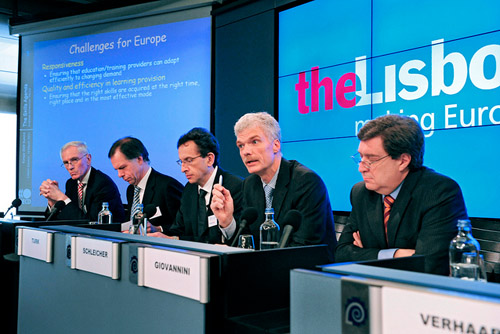
What are your thoughts on the Singapore system?
Singapore is easy to understand because the system is well documented and highly institutionalized. Singapore’s National Institute for Education as a university-based teacher education institution provides the theoretical foundation to produce “thinking teachers” but has strong partnerships with key stakeholders and the schools to ensure strong clinical practice and realities of professionalism in teacher development. Singapore’s new TE21 Model seeks to enhance key elements of teacher education, including the underpinning philosophy, διδακτέα ύλη, desired outcomes for our teachers, and academic pathways. These are considered essential prerequisites in meeting the challenges of the 21st century classroom. Their model focuses on three value paradigms: Learner-centered, Teacher Identity and Service to the Profession and Community. Learner-centered values puts the learner at the centre of teachers’ work by being aware of learner development and diversity, believing that all youths can learn, caring for the learner, striving for scholarship in content teaching, knowing how people learn best, and learning to design the best learning environment possible. Teacher identity values refer to having high standards and strong drive to learn in view of the rapid changes in the education milieu, to be responsive to student needs. The values of service to the profession and community focuses on teachers’ commitment to their profession through active collaborations and striving to become better practitioners to benefit the teaching community. The model also underscores the requisite knowledge and skills that teachers must possess in light of the latest global trends, and to improve student outcomes.
Finally what are your thoughts on the Japanese System?
What’s interesting in Japan is their approach to build on the knowledge of the profession, through regular lesson studies in which all teachers take part. The Japanese tradition of lesson study in which groups of teachers review their lessons and how to improve them, in part through analysis of student errors, provides one of the most effective mechanisms for teachers’ self-reflection as well as being a tool for continuous improvement. Observers of Japanese elementary school classrooms have long noted the consistency and thoroughness with which a math concept is taught and the way in which the teacher leads a discussion of mathematical ideas, both correct and incorrect, so that students gain a firm grasp on the concept. This school-by-school lesson study often culminates in large public research lessons. Για παράδειγμα, when a new subject is added to the national curriculum, groups of teachers and researchers review research and curriculum materials and refine their ideas in pilot classrooms over a year before holding a public research lesson, which can be viewed electronically by hundreds of teachers, researchers and policymakers. The tradition of lesson study in Japan also means that Japanese teachers are not alone. They work together in a disciplined way to improve the quality of the lessons they teach. That means that teachers whose practice lags behind that of the leaders can see what good practice is. Because their colleagues know who the poor performers are and discuss them, the poor performers have both the incentive and the means to improve their performance. Since the structure of the East Asian teaching workforce includes opportunities to become a master teacher and move up a ladder of increasing prestige and responsibility, it also pays the good teacher to become even better.
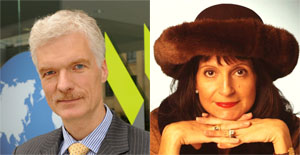
Photos courtesy of the OECD.
Στο παγκόσμιο Αναζήτηση για Εκπαίδευση, μαζί μου και παγκοσμίως γνωστή ηγέτες σκέψης συμπεριλαμβανομένου του Sir Michael Κομμωτήριο (Ηνωμένο Βασίλειο), Ο Δρ. Michael Block (ΗΠΑ), Ο Δρ. Leon Botstein (ΗΠΑ), Καθηγητής Clay Christensen (ΗΠΑ), Ο Δρ. Linda Ντάρλινγκ-Hammond (ΗΠΑ), Ο Δρ. Madhav Chavan (Ινδία), Ο καθηγητής Michael Fullan (Καναδάς), Ο καθηγητής Howard Gardner (ΗΠΑ), Ο καθηγητής Yvonne Hellman (Η Ολλανδία), Ο καθηγητής Kristin Helstad (Νορβηγία), Jean Hendrickson (ΗΠΑ), Καθηγητής Rose Hipkins (Νέα Ζηλανδία), Καθηγητής Cornelia Hoogland (Καναδάς), Η κ. Chantal Kaufmann (Βέλγιο), Ο Δρ. Eija Kauppinen (Φινλανδία), Υφυπουργός Tapio Kosunen (Φινλανδία), Ο καθηγητής Dominique Λαφοντέν (Βέλγιο), Ο καθηγητής Hugh Lauder (Ηνωμένο Βασίλειο), Καθηγητής Ben Levin (Καναδάς), Καθηγητής Barry McGaw (Αυστραλία), Shiv Nadar (Ινδία), Καθηγητής R. Natarajan (Ινδία), Ο Δρ. PAK NG (Σιγκαπούρη), Ο Δρ. Denise Πάπα (ΗΠΑ), Sridhar Rajagopalan (Ινδία), Ο Δρ. Diane Ravitch (ΗΠΑ), Sir Ken Robinson (Ηνωμένο Βασίλειο), Καθηγητής Pasi Sahlberg (Φινλανδία), Andreas Schleicher (PISA, ΟΟΣΑ), Ο καθηγητής Δρ. Wolfgang Schneider (Γερμανία), Ο Δρ. Anthony Seldon (Ηνωμένο Βασίλειο), Ο Δρ. David Shaffer (ΗΠΑ), Ο Δρ. Kirsten Μοναδική Are (Νορβηγία), Στήβεν Spahn (ΗΠΑ), Yves Theze (Γαλλικό λύκειο των ΗΠΑ), Ο καθηγητής Charles Ungerleider (Καναδάς), Ο καθηγητής Tony Wagner (ΗΠΑ), Sir David Watson (Ηνωμένο Βασίλειο), Καθηγητής Dylan Γουίλιαμ (Ηνωμένο Βασίλειο), Ο Δρ. Mark Wormald (Ηνωμένο Βασίλειο), Ο καθηγητής Theo Wubbels (Η Ολλανδία), Ο καθηγητής Michael Young (Ηνωμένο Βασίλειο), και ο καθηγητής Minxuan Zhang (Κίνα) καθώς εξερευνούν τα μεγάλα ζητήματα της εκπαίδευσης εικόνα που όλα τα έθνη αντιμετωπίζουν σήμερα. Η Παγκόσμια αναζήτηση για την Εκπαίδευση της Κοινότητας Σελίδα
C. M. Rubin είναι ο συγγραφέας των δύο πολυδιαβασμένα online σειρά για την οποία έλαβε ένα 2011 Βραβείο Upton Sinclair, “Η Σφαιρική Αναζήτηση για Εκπαίδευση” και “Πώς θα μας Διαβάστε?” Είναι επίσης ο συγγραφέας του μπεστ σέλερ τρία βιβλία, Συμπεριλαμβανομένων Η Ρεάλ Αλίκη στη Χώρα των Θαυμάτων.


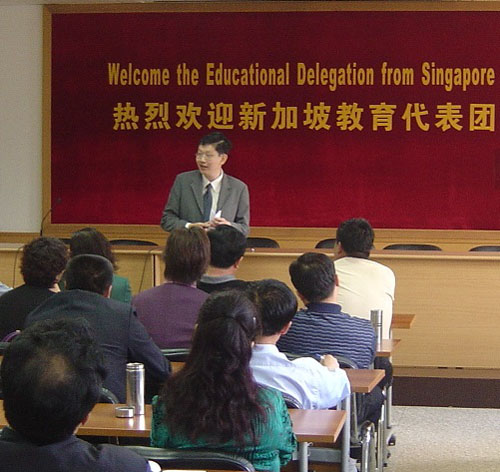
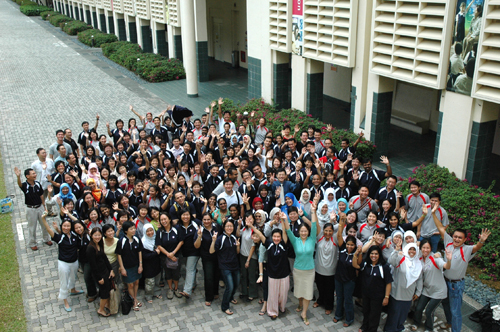
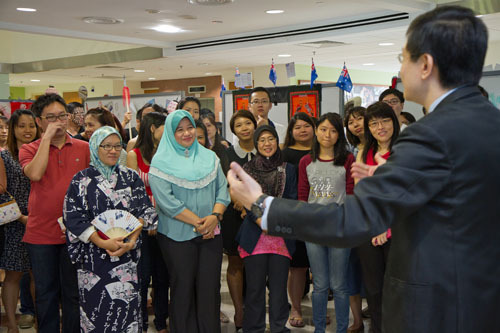
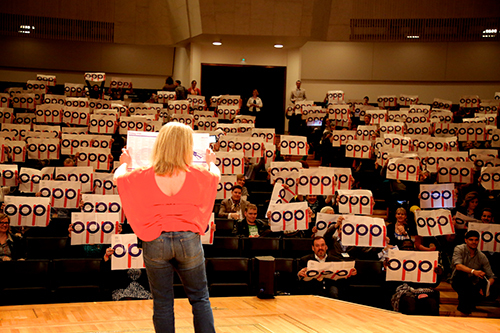
Πρόσφατα σχόλια